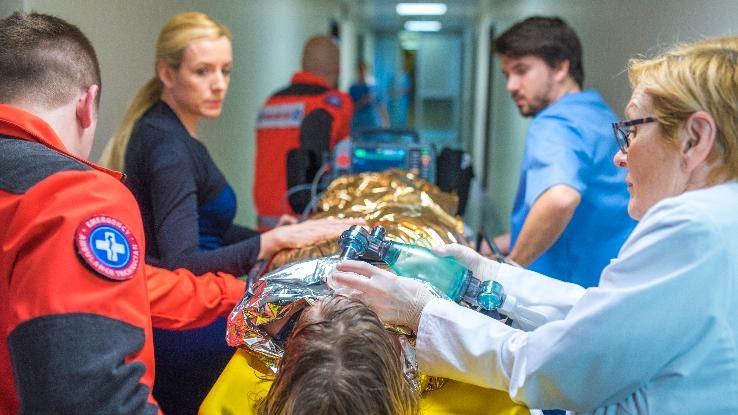What Would Happen to the Body if the Body Temperature Continued to Decrease

It can be really uncomfortable to feel cold, especially if it's happening pretty constantly. If you're shivering despite comfortable temperatures and a mountain of blankets, you might be experiencing low body temperature. According to the Mayo Clinic, a body temperature below 95 degrees Fahrenheit — also known as hypothermia — can be dangerous to one's health. So, what causes low body temperature — and are there ways to prevent it and the associated health risks?
When Your Body Temperature Is Too Low
On average, the human body retains a temperature of about 98.6 degrees Fahrenheit, though a healthy body temperature can range from 97 to 99 degrees. It's perfectly normal for your body temperature to fluctuate and, on occasion, drop below 97 degrees, but this kind of dip shouldn't be an everyday occurrence.

Of course, sometimes there's a more obvious connection between feeling cold and the cause of said chilliness. For example, you might not be wearing clothes that keep you warm enough or you may have spent a prolonged period of time in a colder environment or living space. Still, sometimes a cold feeling doesn't have a clear correlation.
Some folks grappling with low body temperature experience chills: They shiver uncontrollably and feel cold, even though their body temperature is seemingly normal. Other folks might feel cold in cooler environments, or exhibit a cold intolerance. This is a sign that their body is hesitant to warm itself, something that could stem from health conditions and disorders, such as anorexia, anemia and hypothyroidism. Many symptoms of cold intolerance include brittle hair or fingernails; constipation; depression; fatigue; hair loss; shortness of breath; tingling in the hands or feet; body weakness; weight gain; and pale skin.
What Is Hypothermia?
According to the Mayo Clinic, hypothermia is a dangerous medical emergency where your body temperature falls too far below the normal range. The Cleveland Clinic explains that while mild cases are common, approximately 1,300 Americans die of hypothermia every year. When experiencing hypothermia, the human body loses heat faster than it can produce heat. This condition can then cause your heart, nervous system and other organs to malfunction. If left untreated, hypothermia can lead to heart and respiratory system failure.

Hypothermia is often caused by exposure to extremely cold weather — or an immersion in cold water. You can treat hypothermia until further help arrives by slowly warming the individual with blankets and making sure their skin is dry. The most clear symptom of hypothermia is, unsurprisingly, shivering. Of course, it's natural to shiver when the temperature outside drops. After all, shivering is an automatic defense against these chilly conditions and a sign that your body is trying to warm itself. However, constant shivering is a cause for alarm.
Other symptoms of hypothermia include slurred speech or mumbling; shortness of breath; cold palms and feet; a weak pulse; clumsiness; drowsiness or low energy; memory loss; loss of consciousness; and bright red, cold skin, especially in infants. Usually, someone with hypothermia is unaware of the severity of their condition — they just think they're cold — and it's this confusion that can lead to their condition going untreated.
Other Causes of Low Body Temperature
Some people might have a low body temperature without experiencing freezing outdoor temperatures or taking a plunge in cold water. There could be health or age factors that play a role in how your body responds to heat. These factors include fatigue; dehydration; aging; nerve damage; alcohol and recreational drugs; and medications like antidepressants, narcotic pain medications and sedatives.

Additionally, some medical disorders and conditions can cause low body temperature. These disorders and conditions can include poor nutrition; diabetes; Parkinson's disease; sepsis; hypoglycemia; trauma to the spine; dementia; and recent stroke. Psychiatric illnesses can also make it more difficult for people to handle cold conditions.
Ways to Treat Low Body Temperature
When treating hypothermia, move yourself — or the person experiencing the condition — to a warm, dry location. While waiting for medical assistance, remove any wet clothing and cover up with a warm jacket, hat and/or blanket.

According to the Cleveland Clinic, severe cases of hypothermia require immediate medical attention. During these cases, doctors may insert an IV into a patient's vein to pump warm fluids into the body. In addition, healthcare professionals may provide the patient with warm oxygen through a breathing tube or mask. In some cases, doctors may even deem it necessary to use a machine that warms blood and pumps it back into the body.
How to Prevent Low Body Temperature
There are many simple ways to prevent low body temperature or hypothermia — starting with how you dress. When in a cold environment, always wear a hat that covers your ears, as well as layered clothing that's both warm and dry. For an extra boost, try to eat and drink warm foods and fluids and, if you do venture outdoors, be sure to wear warm footwear and mittens to accompany that hat and layered clothing.

Know your limits: Avoid strenuous outdoor activity — and be sure to take breaks — since exhaustion causes a temperature imbalance in your body. Additionally, be sure to keep your living spaces at a temperature above 68 degrees and, if you start to feel cold indoors, move around to increase your body temperature.
In the event that someone has hypothermia — and they are treated properly — they will usually make a full recovery, free from any long-term effects. Still, it's crucial to monitor your body temperature to avoid hypothermia in the first place. While it's normal to feel cold at times, it's never normal to feel constantly frigid. Always feeling cold? Consider how often you feel that way and what parts of your body are most impacted. If nothing helps you warm up, meet with your doctor to begin a treatment plan.
Resource Links:
- "Hypothermia (Low Body Temperature" via Cleveland Clinic
- "Hypothermia" via Mayo Clinic
Source: https://www.thehealthfeed.com/healthy-living/low-body-temperature-causes-symptoms?utm_content=params%3Ao%3D1668962%26ad%3DdirN%26qo%3DserpIndex&ueid=3aa4a871-b293-40da-9259-f0b016cd652d
0 Response to "What Would Happen to the Body if the Body Temperature Continued to Decrease"
Post a Comment